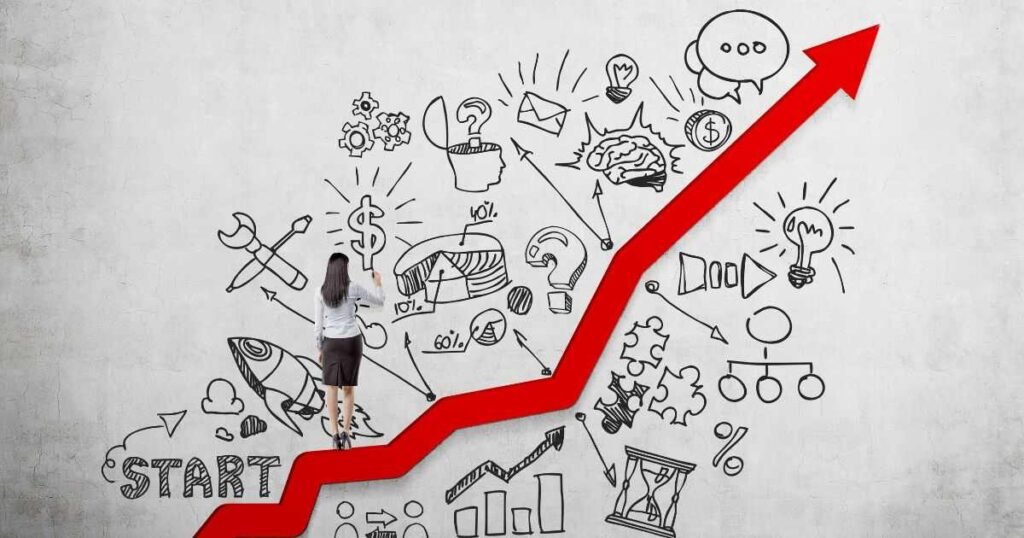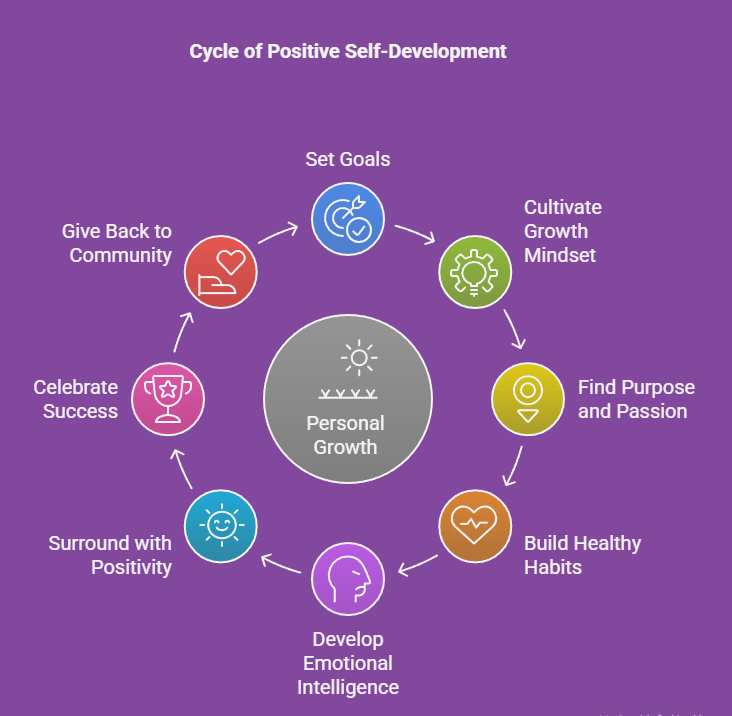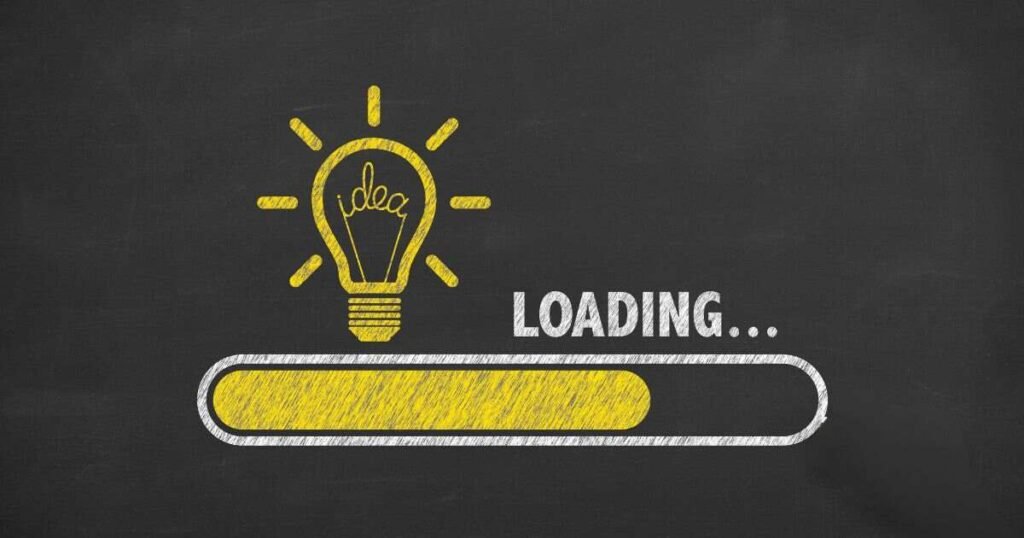Personal growth isn’t just a trendy concept; it’s a fundamental aspect of living a rich, purposeful life.
Many people desire, “I will develop myself in a positive manner.”
The answer lies in learning how to maintain internal motivation and overcome obstacles in self-improvement.
Let’s explore powerful methods to help you become your best self.
I Will Develop Myself in a Positive Manner Meaning

The phrase “I will develop myself in a positive manner” signifies a commitment to personal growth in ways that are beneficial and constructive.
Self-development helps build confidence, improve relationships, and set a foundation for future success.
This holistic approach includes various aspects such as mental, emotional, physical, and social growth.
It suggests an ongoing process of continuous growth rather than a one-time effort.
Let’s proceed with the next section on steps to develop yourself positively.
Steps to Develop Myself in a Positive Manner

The following are the important steps:
Set Clear and Achievable Goals
Setting goals is a cornerstone of self-improvement, offering guidance, inspiration, and a clear sense of direction.
However, not all goals are created equal.
To truly develop yourself in a positive manner, it’s crucial to set clear and achievable goals that align with your values and aspirations.
The Power of Effective Goal Setting
When you set clear goals, you’re essentially creating a roadmap for your personal growth journey. This process helps you:
- Focus your efforts on what truly matters
- Stay motivated and committed to your personal development plan
- Track your progress and celebrate achievements along the way
- Build confidence as you accomplish milestones
The SMART Goal Framework
The SMART goal-setting framework is a powerful tool for crafting effective objectives.
It is one of the most effective methods for setting clear and achievable goals.
Let’s break down each component:
- Specific: Clearly define what you want to achieve.
- Measurable: Establish concrete criteria for measuring progress and metrics to track your advancement. For the presentation goal, count the filler words used or ask colleagues to rate your performance on a scale of 1-10.
- Achievable: Make sure your objectives are within reach and practical to accomplish. At the same time, don’t hesitate to challenge yourself and aim for significant achievements. If you’ve never given a presentation before, aiming to speak at a large event within a month might be unrealistic.
- Relevant: Align your goal with your overall personal development objectives. Your goals contribute meaningfully to your growth. Improving public speaking aligns with your career aspirations or desire for self-confidence, making it a relevant goal.
- Time-bound: Set a specific timeframe for reaching your goal.
I will cut my sugar intake by 50% in the next two months. Establish a specific timeframe for reaching your goal.
Implementing Your Goals
Once you’ve set your SMART goals, consider these tips for successful implementation:
- Write your goals down and place them somewhere visible as a daily reminder.
- Break larger goals into smaller, manageable tasks or milestones.
- Periodically assess and modify your aims as circumstances change.
- Share your aspirations with a dependable friend or mentor for accountability.
- Celebrate your progress, no matter how small, to maintain motivation.
The process of setting and working towards goals builds discipline, self-awareness, and resilience.
As you achieve your goals, you’ll not only grow in specific areas but also develop a stronger sense of self-efficacy – the belief in your ability to succeed.
In the next section, we’ll explore how cultivating a growth mindset can further enhance your personal development journey and complement your goal-setting efforts.
Cultivate a Growth Mindset

Positive self-development requires a growth mindset.
A growth mindset is a belief that with dedication, hard work, and learning, abilities and intelligence can improve. In contrast, a fixed mindset believes abilities are static.
The Benefits of Adopting a Growth Mindset
Developing a growth mindset brings personal benefits.
- Improved strength and resilience in the face of adversity.
- Embrace new experiences and push beyond your usual boundaries.
- Improved learning and skill acquisition
- Enhanced problem-solving abilities
- Increased motivation and achievement.
- Better relationships and collaboration abilities
Practical Tips to Develop a Growth Mindset
1. Add “yet” to your self-talk when facing a challenge. Replace “I can’t do this” with “I haven’t mastered this yet.” By making this small shift, you can witness improvement with effort and time.
2. See hard tasks as chances to grow and learn, not avoid them. Each challenge strengthens abilities and expands skill set.
3. Celebrate the journey, not just the destination. The path to learning and getting better is really valuable.
4. Approach situations with an open mind and a hunger to learn. Ask away, get feedback, and be open-minded.
5. Reflect on both successes and setbacks regularly. Ask yourself: • “What insights did I gain from this situation?” How can I apply what I’ve learned to future situations? • What would I do differently next time?
6. View failure as a learning opportunity. Evaluate mistakes and seek improvement for next time.
7. Pay attention to your self-talk and language for growth. Replace fixed mindset phrases with growth-oriented alternatives: Instead of “I’m not good at this,” say “I’m improving at this.” Rather than “This is too hard,” think “This may take some time and effort.”
8. Put yourself in situations that test your abilities. This could mean new work responsibilities, learning a skill, or setting higher personal goals.
9. Tie personal growth to a greater purpose. Knowing how growth benefits goals or others can motivate.
Be patient and celebrate small changes in your thinking and behavior.
As you cultivate this mindset, you’ll continually develop yourself in a positive manner.
In the next section, we’ll explore your purpose and passion in furthering your personal development journey.
Finding Your Purpose and Passion
Purposeful living is about using your unique gifts and values to make a positive impact.
Reflecting on your values, strengths, and interests is the starting point for uncovering your purpose.
Ask yourself what truly matters to you, what you’re naturally good at, and what activities bring you joy.
Identify professions that align with your passions and natural abilities.
A fulfilling path combines passions, values, and financial stability.
Venture beyond your boundaries to pursue your passions.
Keep a personal log to record your thoughts, emotions, and daily experiences.
Stay open to change and new opportunities as your purpose evolves.
Consider a side hustle or entrepreneurship if traditional jobs aren’t satisfying.
Remember, life is more than just your career.
It includes all areas of your life, such as relationships, hobbies, and personal growth.
Building Healthy Habits
Healthy habits are essential for personal growth.
A routine promotes consistency and discipline.
Routines help you stay on track with exercise, diet, and personal projects.
New habits need commitment and consistency.
Here’s how to establish and maintain healthy habits:
1. Start Small: Begin with manageable changes. Instead of a complete overhaul, just start with one small habit and go from there.
2. Track Your Progress: Keep a habit tracker to monitor your consistency. Witnessing your own growth can serve as a powerful source of inspiration.
3. Stay Accountable: Share your goals with a friend or join a community. Accountability can help you stay committed.
Developing Emotional Intelligence

Emotional intelligence (EI) refers to one’s ability to recognize, interpret, and manage personal emotions while also navigating the feelings of those around them.
High EI contributes to better relationships, decision-making, and stress management.
To develop EI:
Identify triggers and your typical responses.
Control your impulses and reactions to self-regulation.
Take a moment to pause when stressed.
Improving Empathy and Social Skills
Empathy is the ability to understand and share the feelings of others.
It can improve your interactions and relationships:
Listen actively, pay full attention to the speaker, and acknowledge their feelings. Avoid interrupting and ask clarifying questions.
Try to see things from others’ perspectives. This can foster understanding and compassion.
Techniques for Better Self-Regulation
Self-regulation requires effective control of emotions and behaviors. Techniques include:
Stay calm and focused with regular mindfulness exercises.
Breathing exercises can reduce stress and improve emotional control.
Surround Yourself with Positive Influences
Our environment profoundly shapes our mindset, habits, motivation, opportunities, and stress levels.
Immerse yourself in positive influences to accelerate growth and create a supportive ecosystem for self-improvement.
Share your growth mindset goals with others for accountability and support.
Identifying and Nurturing Positive Relationships:
- Assess Your Current Relationships • Who lifts you and supports your growth? Who consistently brings negativity or holds you back?
- Seek Out Growth-Oriented Individuals • Look for people who inspire you and embody the qualities you aspire to develop. Join groups or communities aligned with your personal development goals.
- Cultivate Meaningful Connections • Invest time in relationships that are mutually supportive and growth-oriented. Practice active listening and empathy to deepen your connections.
- Find a Mentor or Accountability Partner • Seek guidance from someone who has achieved what you’re working towards. Partner with a friend or colleague who shares your commitment to personal growth.
- Contribute Positively to Others’ Growth • Be a source of encouragement and support for others on their development journey. Share your knowledge and experiences to help others grow.
- Know when to let go of toxic relationships or environments to prioritize your well-being and growth.
Creating a Positive Physical Environment
- A tidy, organized environment can promote clarity of mind and reduce stress.
- Surround Yourself with Inspirational Elements. Display motivational quotes, vision boards, or artwork that inspires you.
- Optimize your workspace to enhance focus and productivity. Introduce greenery or natural elements to your environment to elevate your mood and alleviate stress.
- Limit Exposure to Negative Media. Please pay attention to the media you consume and consider its effects on your mental state.
Celebrating Successes and Recognizing Progress
Acknowledging your progress reinforces your self-belief and fuels your desire to grow.
Self-reward is a powerful tool for motivation.
Establish a reward system for yourself to celebrate milestones and accomplishments.
Treats, experiences, and relaxation strengthen positive behaviors and create a sense of accomplishment.
Tracking your progress helps you visualize your success and stay motivated o reach new heights.
Keep a journal or use a planner to document your achievements and milestones.
Reflect on how far you’ve come and celebrate your successes, no matter how small.
Embrace setbacks, stay hopeful, and focus on progress.
Surround yourself with inspiring people, engage in activities you love, and practice gratitude.
Remember, each step forward, regardless of size, brings you closer to achieving your objectives.
Giving Back to the Community
Giving back to your community benefits everyone.
Volunteering brings purpose, connection, and satisfaction.
Volunteering benefits individuals and communities. It offers skill development, valuable experience, and social network expansion.
Giving back to others can boost your self-esteem, reduce stress, and increase your overall happiness.
Your positive actions create a cascade of beneficial effects that reach far beyond your sphere.
Serving others is easier than you think. Identify organizations or causes in your community that match your passions and values.
Consider volunteering your time at a homeless shelter, a food bank, an animal rescue, or an environmental conservation group.
Minor acts of kindness can create a big impact.
Educate yourself on social issues and become an informed citizen. Use your voice to raise awareness and facilitate change.
Tools and Techniques for Positive Self-Development
Following are the self-growth techniques:
Time Management Techniques
Master time management to prioritize tasks, reduce stress, and create space for what truly matters.
- Prioritization: Identify and rank tasks based on their importance and urgency.
- Time Blocking: Allocate specific time slots for different activities or tasks to stay focused and organized.
- Pomodoro Technique: Work in intervals (e.g., 25 minutes focused work followed by a 5-minute break) to enhance productivity and maintain energy.
- Setting SMART Goals: Define Specific, Measurable, Achievable, Relevant, and Time-bound goals to maintain clarity and motivation.
- Delegate: Assign tasks to others who are capable, freeing up your time for more critical responsibilities.
- Eliminate Time Wasters: Identify and minimize activities that consume time without adding value.
- Use Tools and Technology: Utilize apps, calendars, and task management tools to organize tasks and track progress efficiently.
- Review and Adjust: Regularly assess your schedule and adjust priorities as needed to stay on track with goals and commitments.
Mindfulness and Meditation
Mindfulness is being fully present and aware of thoughts and feelings without distraction or judgment.
It complements self-reflection by helping you observe your inner experiences with greater clarity and acceptance.
Benefits of Mindfulness:
• Reduced stress and anxiety
• Improved focus and concentration
• Enhanced emotional regulation
• Greater self-compassion
• Increased overall well-being
Incorporating Mindfulness into Your Daily Routine
- Practice mindful breathing daily for a few minutes. Notice your breath and redirect your attention when your mind wander
- Systematically scan your body, noting sensations without judgment.
- Eat one meal a day slowly and mindfully. Pay attention to the flavors, textures, and sensations of eating.
- When walking, be mindful of your feet, body, and surroundings.
- Practice giving your full attention to the speaker. Be aware of your mind drifting and guide it back to the present.
- Use mindfulness apps like Headspace, Calm, or Insight Timer for guided meditation.
Journaling for Self-Reflection
Journaling is a powerful tool for self-reflection and personal growth: (list)
Writing down thoughts clarifies emotions.
Tracking progress through past entries helps you spot achievements.
Journaling facilitates problem-solving and goal-setting.
Writing about stress helps reduce intensity of emotions and promotes emotional healing.
Tips for Starting and Maintaining a Journal
Choose between digital or pen and paper.
Dedicate a few minutes daily to journaling.
Write freely without worrying about grammar or spelling. Express yourself sincerely.
If you’re uncertain what to write about, use guided prompts to inspire your journaling.
Prompts for Self-Reflection and Growth
- What am I grateful for today?
- What challenges did I overcome this week, and how did I handle them?
- What are my immediate and future aspirations, and how can I work towards them?
Learning and Continuous Education
Trying out new hobbies and interests gets you fired up and creative.
Take a leap and try something different.
Doing what you love makes you happier and more fulfilled.
Seeking expertise enhances problem-solving abilities.
Evaluate your strengths, weaknesses, and growth areas.
Read books, attend workshops, listen to podcasts, or take online courses to acquire new knowledge and skills.
Connect with industry mentors and experts for valuable insights.
Learning constantly makes you more adaptable and well-rounded.
Various Methods of Learning
Diversify your learning methods for continuous learning:
- Reading books, both fiction and non-fiction, is a great way to gain insights and knowledge.
- Keep up with the latest research and trends in your interests with articles and journals. Go online and read some good blogs, websites, and digital publications.
- Platforms like Coursera, edX, and Udemy have courses on all sorts of topics. • Many universities provide free or low-cost online courses.
- Podcasts and audiobooks are great for learning on the go. It covers a ton of topics from experts and thought leaders.
- Attend workshops for hands-on experience, in-person or virtually. Participate in webinars for targeted learning on specific topics.
- Find people who can mentor you in areas you want to grow. Get a coach for personalized guidance.
- Engage in experiential learning through new challenges or projects. Travel to broaden cultural horizons and gain new perspectives.
- Participate in forums or discussion groups aligned with your interests. • Join book clubs or study groups.
Don’t forget, the aim of lifelong learning is not simply to gather facts, but to evolve, adjust, and enhance oneself.
Final Thought
Personal growth is not a mere trend; it’s a lifelong commitment to living with purpose and intention.
Setting clear goals, cultivating a growth mindset, and finding your purpose lay the foundation for a fulfilling journey of self-improvement.
Each step, such as adopting new habits, developing emotional intelligence, or surrounding yourself with positive influences, enriches your life and adds meaning.
Stay patient and persistent, and let every achievement, no matter how small, show your dedication.
The journey of personal development is as valuable as the destination.
Every step forward, however incremental, brings you closer to becoming your best self.
Keep moving forward with optimism and purpose, and enjoy the process of becoming who you’re meant to be.
“I will develop myself in a positive manner” is not just a statement; it’s a promise to yourself to embrace growth and positive change every day.
Great informative post! Developing emotional intelligence is an area in which I need to improve.
Thank you! I’m glad you found the post informative. Developing emotional intelligence takes time, and realizing the need to improve is a great start. Keep going as each step forward helps you. If you need guidance, I’m here to help!